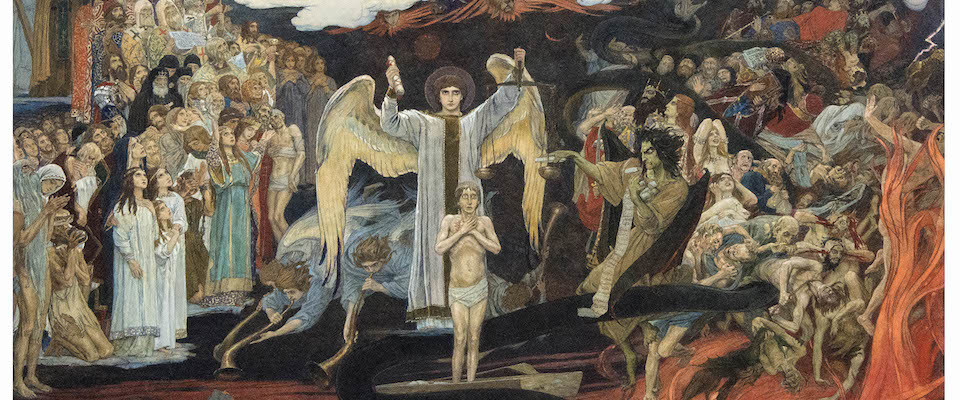
It is interesting that a much higher percentage of people believe in the existence of heaven than believe in the existence of hell. According to the Bible, though, hell is just as real as heaven. The Bible clearly and explicitly teaches that hell is a real place to which the wicked/unbelieving are sent after death. We have all sinned against God (Romans 3:23). The just punishment for that sin is death (Romans 6:23). Since all of our sin is ultimately against God (Psalm 51:4), and since God is an infinite and eternal Being, the punishment for sin, death, must also be infinite and eternal. Hell is this infinite and eternal death which we have earned because of our sin.
The punishment of the wicked dead in hell is described throughout Scripture as “eternal fire” (Matthew 25:41), “unquenchable fire” (Matthew 3:12), “shame and everlasting contempt” (Daniel 12:2), a place where “the fire is not quenched” (Mark 9:44-49), a place of “torment” and “fire” (Luke 16:23-24), “everlasting destruction” (2 Thessalonians 1:9), a place where “the smoke of torment rises forever and ever” (Revelation 14:10-11), and a “lake of burning sulfur” where the wicked are “tormented day and night forever and ever” (Revelation 20:10).
The punishment of the wicked in hell is as never ending as the bliss of the righteous in heaven. Jesus Himself indicates that punishment in hell is just as everlasting as life in heaven (Matthew 25:46). The wicked are forever subject to the fury and the wrath of God. Those in hell will acknowledge the perfect justice of God (Psalm 76:10). Those who are in hell will know that their punishment is just and that they alone are to blame (Deuteronomy 32:3-5). Yes, hell is real. Yes, hell is a place of torment and punishment that lasts forever and ever, with no end. Praise God that, through Jesus, we can escape this eternal fate (John 3:16, 18, 36).
The Bible says that hell is eternal (Matthew 25:46). Many people struggle with the justice of that. They question how it is just for God to punish a person for eternity in response to only a human lifetime of 70, 80, 90, or even 100 years of sin. How does a sinner’s finite lifespan merit an infinitely long punishment?
There are two biblical principles that clearly declare eternity in hell to be the just punishment for sin, no matter how long one’s earthly life lasted.
First, the Bible declares that all sin is ultimately against God (Psalm 51:4). The extent of the punishment depends, in part, on the target of the crime. In a human court of law, a physical assault against an individual will usually result in a fine and possibly some time in jail. In contrast, a physical assault against the president or prime minister of a country will likely result in a lifetime in prison. And this is the case despite the fact that the crime was a one-time offense, not a continual, ongoing action. God is infinitely higher and greater than any human being. How much more are our crimes worthy of a great punishment in light of the fact that our sins are against God (Romans 6:23)?
Second, the idea that we cease sinning after death is not taught in the Bible. Are those who go to hell suddenly sinless and perfect? No. Those who go into eternity without Christ will be confirmed in their wickedness. The hard-hearted will be eternally hard-hearted. There will be “weeping and gnashing of teeth” in hell (Matthew 25:30), but no repentance. Sinners in hell will be given over to their own nature; they will be sin-infected, evil, immoral, and depraved beings for all of eternity, forever unredeemed and unregenerate. The lake of fire will be a place of eternal rebellion against God—even as that rebellion is judged (Revelation 20:14–15; cf. Revelation 16:9, 11). Unsaved people do not only sin for 70, 80, 90, or 100 years. They sin for eternity.
What it comes down to is this—if a person wants to be separated from God for eternity, God will grant that desire. Believers are those who say to God, “Your will be done.” Unbelievers are those to whom God says, “Your will be done.” The will of the unsaved is to reject salvation through Jesus Christ and remain in sin; God will honor that decision, and its consequences, for eternity.



